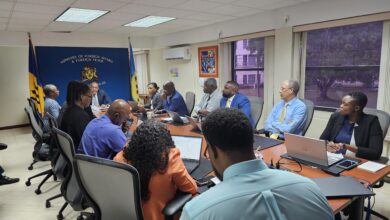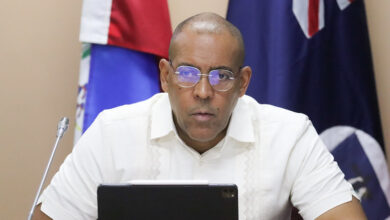IN PHOTO: (Front Row, L-R) Prime Minister of Barbados, Hon Mia Amor Mottley; President of Cuba H.E. Miguel Díaz-Canel Bermúdez; President of Suriname and Chairman of CARICOM, H.E. Chandrikapersad Santokhi; Secretary-General of CARICOM, Dr Carla Barnett
(2nd Row, L-R) Prime Minister of Belize, Hon John Briceño; Prime Minister of St. Kitts and Nevis, Hon Dr Terrance Drew; Prime Minister of Grenada, Hon Dickon Mitchell; Prime Minister of St Vincent and the Grenadines, Dr Hon Ralph Gonsalves; President of Guyana, H.E. Mohamed Irfaan Ali
(Back Row, L-R) Minister of Foreign Affairs, Antigua and Barbuda, Hon E. Paul ‘Chet’ Greene; Minister of Foreign Affairs, Haiti, Hon Jean Victor Généus; Minister of Foreign Affairs, Jamaica, Sen. Hon Kamina Johnson Smith; Minister of Trade and Industry, Trinidad and Tobago, Hon Paula Gopee-Scoon; Minister of Foreign Affairs, The Bahamas, Hon Fred Mitchell
We, the Heads of State and Government of the Caribbean Community (CARICOM) and the Republic of Cuba, meeting in Bridgetown, Barbados, on the occasion of the Eighth CARICOM-Cuba Summit to commemorate with much joy and satisfaction the Fiftieth Anniversary of establishing diplomatic relations with the independent States of CARICOM and Cuba and the Twentieth Anniversary of CARICOM-Cuba Day;
Proud of our shared Caribbean identity and the strong and high level of bilateral and political and cooperative relations, strengthened by the agreements we have signed and through cooperation in international fora and mutual support for multilateral mechanisms that have permitted us to advance our respective national development agendas on behalf of our peoples on the basis of solidarity and complementarity;
Recalling with pride that Cuba was represented at the signing of the Treaty of Chaguaramas which established the Caribbean Community;
Recalling the Declarations of Havana (2002), Bridgetown (2005), Santiago de Cuba (2008), Port of Spain (2011), Havana (2014), Saint Mary’s (2017), and Virtual (2020);
Aware of the importance of continuing to work together, particularly to build economic and climate resilience towards the sustainable development of our countries and for inclusive, just and equitable societies, and to address our shared vulnerabilities as Small Island Developing States and countries with Low-lying coastal areas;
Deeply grieved by the loss of lives and concerned by the extensive socioeconomic effects of the COVID-19 pandemic and other infectious diseases, and the devastating, more frequent and intense weather events that have worsened the multiple crises faced by mankind today;
Conscious that the COVID-19 pandemic has highlighted the systemic failures of the international financial architecture, including the lack of access to development financing and inadequate solutions to address unsustainable debt for small and vulnerable countries, and middle-income countries, and underscoring the urgency for a comprehensive and integrated approach to support the countries of the Caribbean;
Acknowledging with gratitude the medical support to CARICOM Member States from the Government of Cuba to bolster health systems and save lives, including in response to the COVID-19 pandemic;
Acknowledging also that CARICOM Member States had provided support to the Government of Cuba in the fight against the COVID-19 pandemic in the spirit of solidarity and mutual cooperation;
Highlighting the importance of redoubling our efforts to improve the productivity, infrastructure, air and sea connectivity of our countries, as well as to expand our economic and trade ties, through the implementation of the Trade and Economic Cooperation Agreement between CARICOM and Cuba;
Recalling the importance of the Community of Latin American and Caribbean States (CELAC) and the Association of Caribbean States (ACS) as mechanisms for concertation, political dialogue, coordination and the promotion of unity in the region;
Reaffirming our commitment to continue preserving the environmental integrity of the Caribbean Sea and strengthening cooperation within the ACS so as to advance the wellbeing of our peoples;
and
Reaffirming the Proclamation of Latin America and the Caribbean as a Zone of Peace, signed in Havana in January 2014 and its objectives to assure the security and well-being of the Latin American and Caribbean people.
We therefore:
- Reiterate that the unity and integration of our Caribbean region is based on historical ties and respect for the Purposes and Principles enshrined in the Charter of the United Nations and in international law. We underscore our wholehearted support for the sovereignty, territorial integrity, self-determination, non-interference in the internal affairs of any country, the rejection of the use or threat of the use of force, peaceful settlement of disputes, the protection and promotion of human rights for all, as well as the promotion of friendly relations among States irrespective of differences in their political, economic, and social systems or development levels, with the aim to practice tolerance and live together in peace with one another as good neighbors;
- Welcome the outcomes of the regular meetings of Ministers of Foreign Affairs of CARICOM and Cuba, which continue to serve as a platform for political engagement, cooperation, solidarity, collaboration, and for reinforcing our commitment to maintaining the strong fraternal ties which unite us;
- Commemorate the Fiftieth Anniversary of the establishment of CARICOM-Cuba diplomatic relations acknowledging the CARICOM-Cuba partnership as an exemplary model of fruitful and mutually beneficial South-South cooperation;
- Affirm the importance of strengthening South-South cooperation as an expression of solidarity among our countries and for the promotion of bilateral, regional and triangular cooperation and programs for development, within the framework of the development priorities of our countries;
- Highlight the importance of our active participation within CELAC, to address common challenges and advance unity in diversity based on regional consensus;
- Acknowledge that the presidency of Cuba of the Group of 77 and China during 2023 is an excellent opportunity to take advantage of the synergies between the CARICOM and G-77 agendas to promote the development of their members, and foster solidarity and international cooperation;
- Recognise with appreciation the medical cooperation between CARICOM and Cuba and its invaluable contribution to the wellbeing of Caribbean people; in particular, the significant contribution of the Cuban Medical Brigades to the fight against the COVID-19 pandemic;
- Agree to share best practices in the management of the COVID-19 pandemic and other epidemiological conditions common to the Caribbean, and continue to assess the potential for the application of innovative Cuban biotech medicines for the prevention and treatment of COVID-19 and other infectious diseases in CARICOM Member States;
- Recognise that the invaluable cooperation between CARICOM Member States and Cuba in areas such as health, education, agriculture, human resource development and capacity building, construction, sports, and disaster risk reduction and mitigation has significantly contributed to both national and regional development and enhanced the wellbeing of our peoples, and agree to further strengthen cooperation in these areas;
- Continue to collaborate on the implementation of the Center for Stimulating the Development of Children and Young People with Special Educational Needs in Guyana;
- Renew efforts towards the establishment of the Regional School of The Arts in Jamaica;
- Reaffirm the importance of promotion of sustainable tourism as one of the key priorities for economic growth in the Caribbean region, particularly in the context of post COVID-19 recovery efforts, and renew our commitment to strengthening cooperation in this area, including through the implementation of multi-destination tourism in accordance with the terms of the Memorandum of Understanding on Multi-Destination Tourism, as well as, resilience building within the sector between the government of Cuba and CARICOM Member States signed at the 6th CARICOM-Cuba Summit in 2017;
- Reaffirm our commitment to finding avenues for promoting economic and commercial relations by identifying our strengths and possible complementarities, and by implementing and applying the Second Protocol to the CARICOM-Cuba Trade and Economic Cooperation Agreement;
- Acknowledge that recent global developments such as the COVID-19 pandemic, the ongoing multidimensional global crisis, to which the negative effects of the hostilities in Ukraine are added, have exacerbated existing inequalities in food and energy security among other areas. We therefore welcome the CARICOM Agri-Food Systems Agenda aimed at strengthening the current food and nutrition security in the region and achieving the 25 by 2025 Vision for reducing the region’s dependence on imported foods;
- Agree to collaborate to promote food and nutrition security of our peoples;
- Express deep concern that critical economic sectors, infrastructure, the environment, and lives continue to be adversely affected by Climate Change and call for an intensified global effort to keep global temperature rise at 1.5 degrees above pre-industrial levels. Public and private investment to address loss and damage and build resilience necessitate urgent access to adequate, predictable, affordable climate financing, at scale, to achieve climate resilient development. We lament, however, that the current international climate change architecture is in urgent need of reform. It is not responsive to the climate resilience requirements of SIDS, particularly Caribbean SIDS, for which the impact of climate change poses an existential threat. We welcome the Agreement at the COP 27 to provide loss and damage funding for vulnerable countries by climate change;
- Note and support the Bridgetown Initiative which calls for reform of the International Financial Institutions to more equitably provide for Climate Vulnerable and Developing Countries.
- Call for the simplification and streamlining of access criteria across donors and multilateral funds to facilitate greater inflows of climate finance to the region, taking into account the unique and special circumstances of SIDS;
- Urge international financial institutions to take effective measures to strengthen the global financial safety net, assist SIDS in addressing their debt vulnerability and in attaining debt sustainability as soon as possible, as well as to enhance preferential access to development financing by incorporating a multidimensional vulnerability index (MVI) as a complementary criterion for determining access to concessional financing and official development assistance;
- Express deep concern over the inclusion of certain CARICOM Member States on lists of non-cooperative jurisdictions in respect of tax governance and AML-CFT deficiencies and call for a change to this approach which negatively impacts the economies of those countries that have shown their readiness to cooperate and engage in dialogue to find mutually advantageous solutions for the parties;
- Express deep concern over the progressive decline in correspondent banking relations being experienced by developing nations, in particular CARICOM Member States, due to the de-risking actions by some of the major international banking institutions, and the worsening impact this is having on the financial stability and trading ability of the affected countries which constrains their efforts to achieve socioeconomic growth and sustainable development;
- Highlight the importance of reparations and compensation, as an act of justice, for the damages caused by slavery, indentured servitude and native genocide in the Caribbean;
- Reject the imposition of unilateral coercive measures and, in that context, call for an immediate and unconditional end to the economic, commercial, and financial blockade implemented by the Government of the United States of America against Cuba. We reiterate our firm rejection of the enforcement of extra-territorial laws and measures such as the Helms-Burton Act, which grossly violate international law and undermine the sovereignty and interest of third parties;
- Declare October 6 as the CARICOM- Cuba Day against terrorism in memory of the 73 people who died including CARICOM and Cuban nationals in the bombing of the Cubana Airlines in the waters off Barbados on October 6 1976 and for which there has been no accountability.
- Reiterate the rejection of the unilateral lists and certifications that affect Latin American and Caribbean countries; and in this regard, request the immediate exclusion of Cuba from the unilateral list of countries that allegedly sponsor international terrorism;
- Express our gratitude to the Government and People of Barbados for the warm welcome and hospitality afforded to us during the Eighth Summit of Heads of State and Government of the Caribbean Community and the Republic of Cuba;
- Decide to convene the Ninth Summit of Heads of State and Government of the Caribbean Community and the Republic of Cuba; on 8 December 2025, in Cuba and the Seventh CARICOM-Cuba Ministerial Meeting in a CARICOM Member State, in 2023.
- Adopted in Bridgetown, Barbados, on the 6th day of the month of December 2022.






